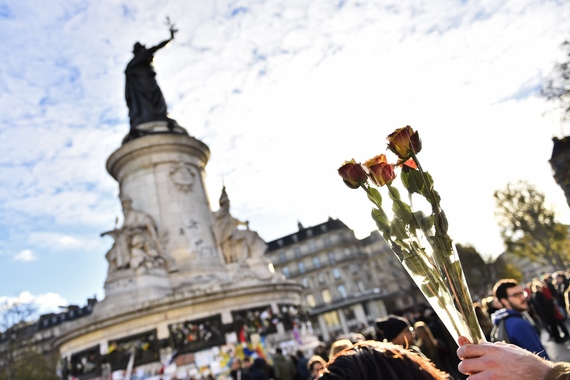
A man holds roses at Place de la Republique (Republic Square) in Paris on November 22, 2015 as he arrives to pay tribute to the victims of the November 13 terror attacks. (Photo by Loic Venance/AFP/Getty Images)
By Charles M. Sennott
PARIS -- In the Place de la Republique, a 19th-century bronze statue of Marianne, the personification of the French republican values of liberty, equality and fraternity, stands 75 feet high, calmly overlooking the square.
At her feet is a makeshift shrine heaped with flowers, flickering candles, placards with defiant messages like "Même pas peur" (Not afraid) and photos of the mostly young people who died in the terrorist attacks that killed 130 people in Paris on Friday, Nov. 13.
Just up the road is the Bataclan concert hall and the cafes which were shot up are still cordoned off with police tape. And just around the corner are the offices of the satirical magazine Charlie Hebdo, where Islamic militants attacked in January. To the north is the Stade de France, where suicide bombers struck as part of the coordinated attacks of that night. This is the geography of terror in Paris.
But just past the Stade de France is Le Bourget, where more than 100 world leaders and thousands of activists and scientists are planning to gather on Nov. 30 for a global conference on climate change.
Paris today is at the center of a global crossroads where two narratives converge. One is a narrative of violence and terror that seeks to divide the world and incite a global conflict. The other is a narrative of hope that seeks to bring the world together to confront a global security threat that military and government leaders say looms larger than terrorism: the impact of climate change.
Indeed, a report commissioned by 20 countries revealed that climate change kills more people each year than terrorism, with some 400,000 killed by factors attributed to climate change. In 2013, a peak year for terrorist murders, there were 13,000 deaths attributed to terrorism.
So a question looms over this 21st gathering of world leaders on climate change, known as the Conference of Parties, or COP21, which gets underway next Monday as world leaders take the podium. The question is: how will the terrorist attacks impact this historic opportunity for a global commitment to reducing greenhouse emissions?
Andrew Steer, president of the World Resources Institute, told reporters last week that he believed a spirit of solidarity has emerged in the aftermath of the attacks, and that it could heighten cooperation among the 190 countries involved in establishing a convention known as the UN Framework of Climate Change (UNFCCC.)
"There is a degree of, sort of, solidarity internationally over [the attacks] that is not exactly unprecedented, but since 9/11, we haven't seen anything quite like that," Steer said. "It is really quite astonishing. It is absolutely amazing -- the desire to do something in common ... If anything, it stiffens the spine in terms of determination to really" reach a long-term climate change deal.
Christiana Figueres, executive secretary of the UN body supervising the COP21, expressed similar optimism in a tweet, insisting that the attacks made the conference more relevant than ever.
Secretary of State John Kerry's recent public remarks and interviews on the Paris attacks seemed to express the same hope. After meeting with French President François Hollande in Paris just days after the attack, Kerry said COP21 "will be an important statement by the world that no one will interrupt the business of the global community - certainly not despicable, cowardly acts of terror."
Kerry is scheduled to return to Paris with President Barack Obama on Nov. 30 to attend COP21 which will continue until Dec. 11.
Bert Wander, the campaign director of a huge rally that had been planned for Nov. 29 to send a message to the world leaders to take concrete actions to curb climate change, said the event was canceled by the French government due to security concerns. He said the organizers understood the reasoning for the cancelation, but stressed that the rallies are a global event with 150 countries taking part and big cities taking part including London, Berlin, Nairobi, São Paulo and others.
GroundTruth met with Wander in Paris on Tuesday to talk about his organization, Avaaz, which means "voice" in several languages, and about the global movement they are behind to raise awareness on climate change.
As he walked through La Republique surrounded by people gathered around the shrines and the ring of satellite TV trucks which idled as correspondents delivered live updates on the attacks, Wander said, "We have to change the narrative of what has happened. There's that narrative of fear that drives people apart... And there is a narrative that is quite the opposite, to trust each other to act in hope and claim a new future that we want -- and need -- in which the world addresses the issue of climate change."
He added, "We live in a world that is global in its nature and the threats are global in their nature. And so the solutions are going to require global solutions. So this is a moment that is a microcosm of the world we live in. And very soon the world will be coming together here in Paris and in rallies in cities around the world to make it clear that we all want an agreement on climate change, and that climate change is the greatest threat of our time."
Charles M. Sennott is the founder and Executive Director of The GroundTruth Project, which is supporting six top, young journalists to cover COP21 and to launch a year-long reporting project on the impact of climate change around the world.
Follow The GroundTruth Project on Twitter: www.twitter.com/GroundTruth
